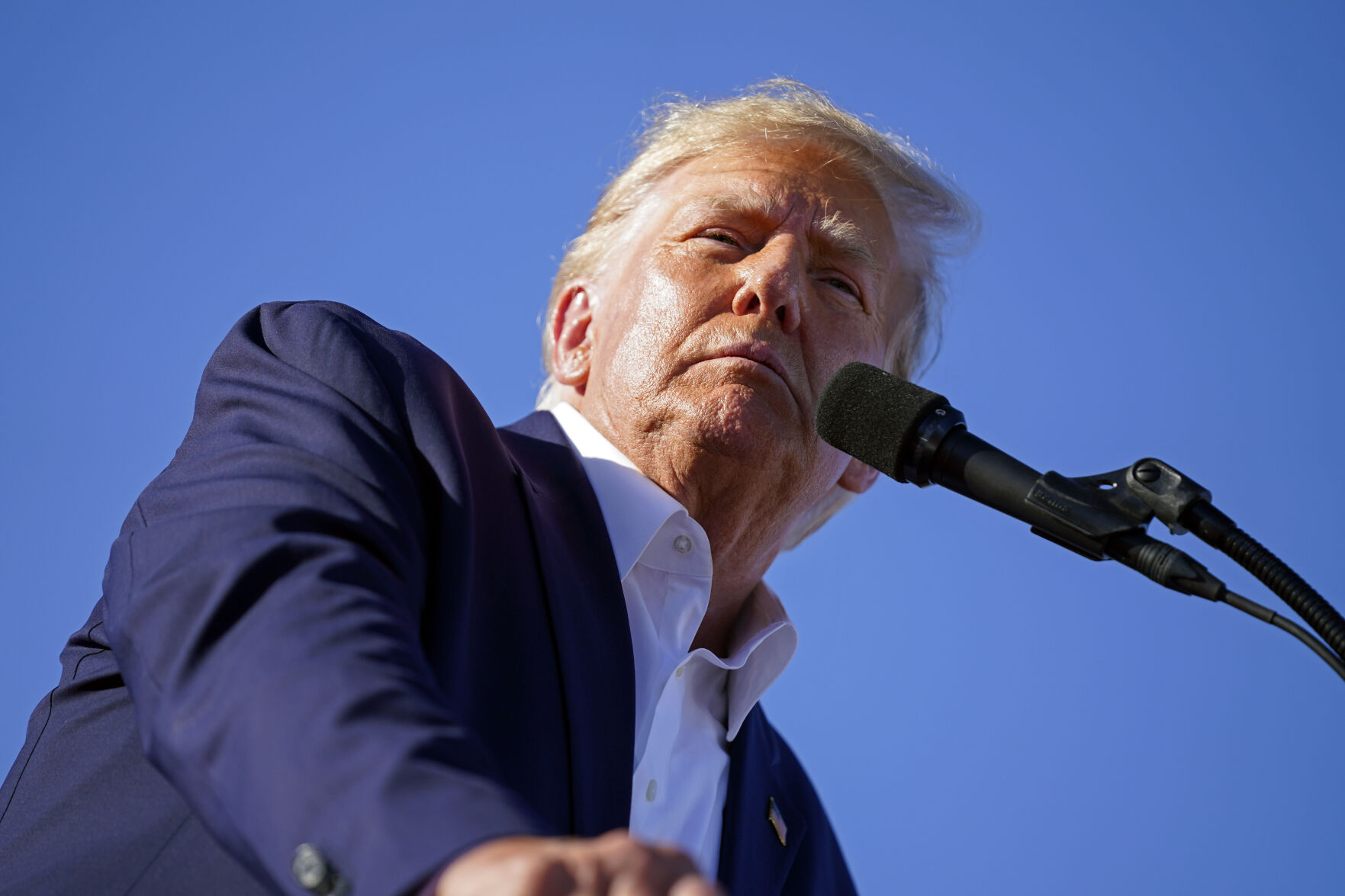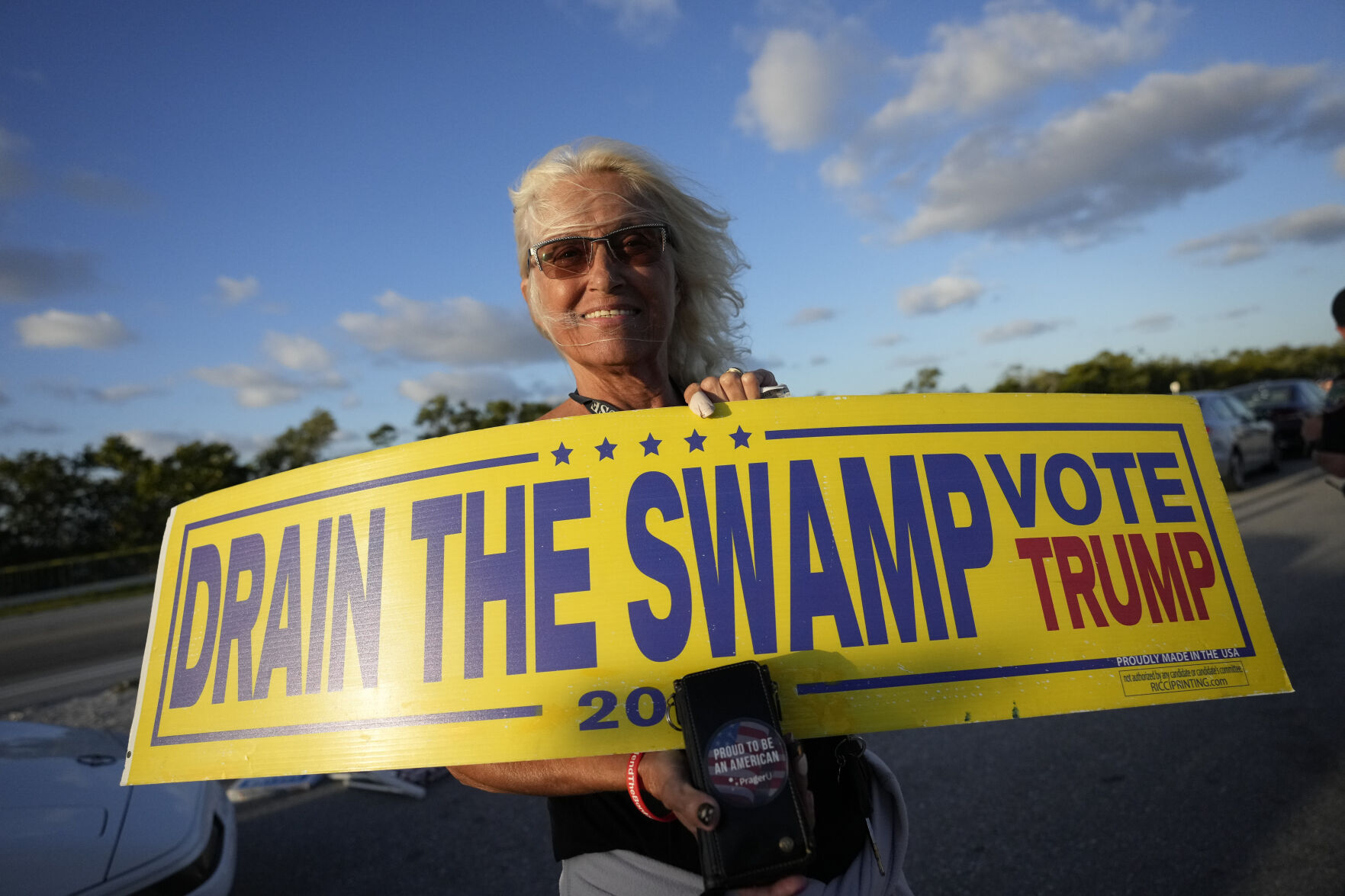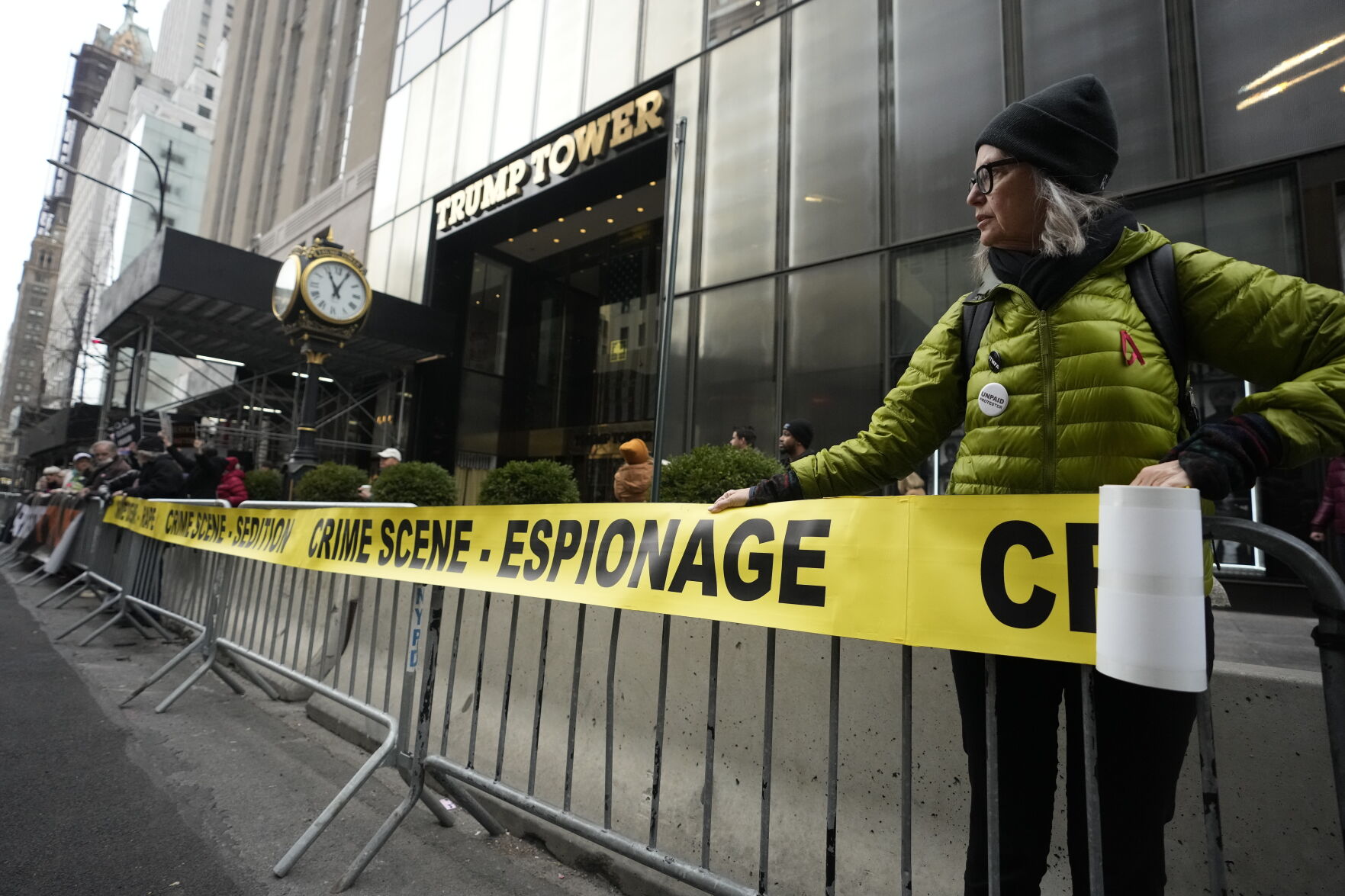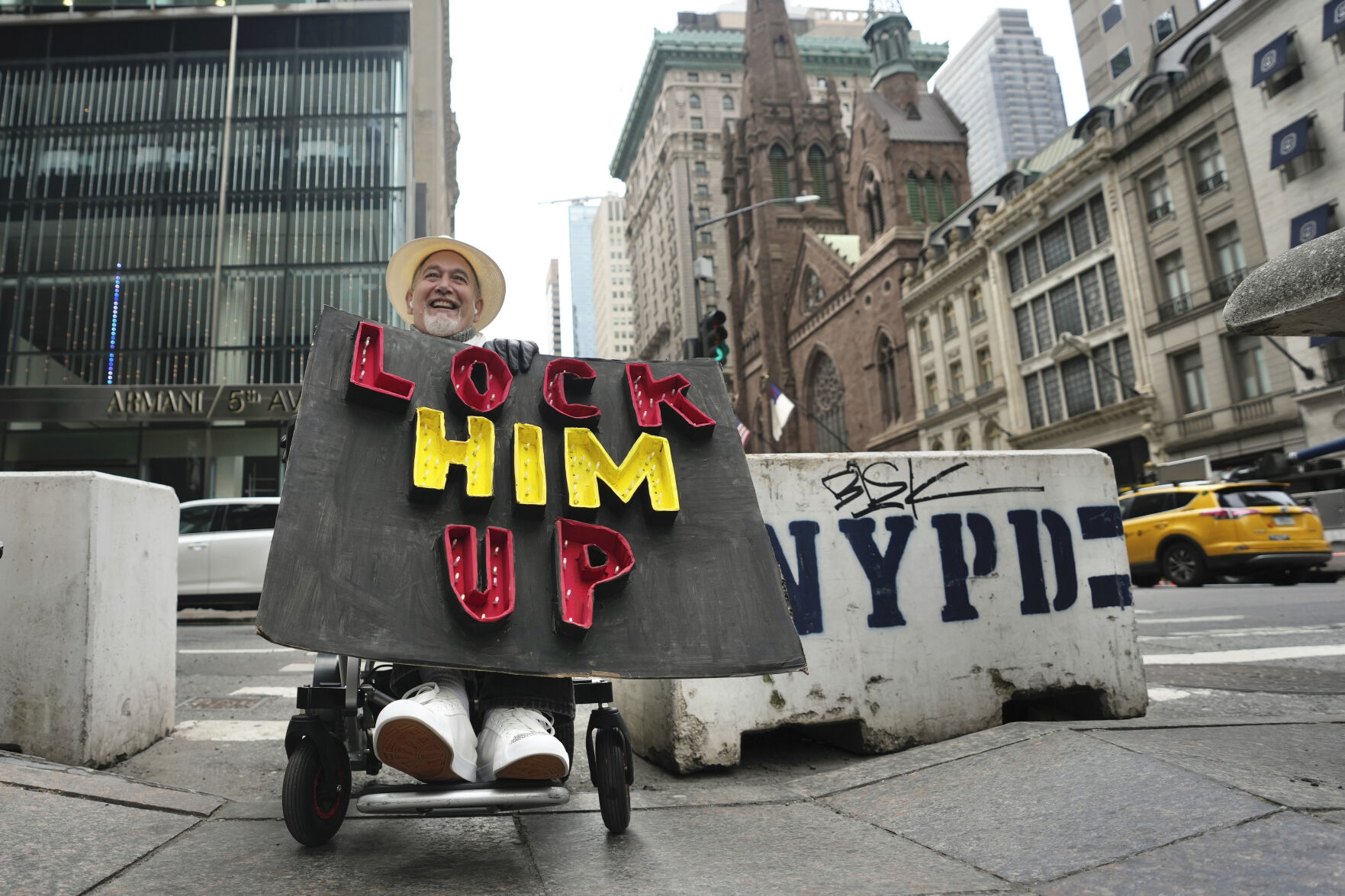NEW YORK — Former President Donald Trump is facing multiple charges of falsifying business records, including at least one felony offense, in the indictment handed down against him by a New York grand jury, two people familiar with the matter told The Associated Press on Friday.
He will be formally arrested and arraigned Tuesday in his hush money case, court officials said — an announcement promising the historic, shocking scene of a former U.S. commander in chief forced to stand before a judge. The indictment against him remains sealed and the specific charges were not immediately known, but details were confirmed by people who requested anonymity to discuss details that aren’t yet public.
The streets outside the courthouse where the arraignment will unfold were calm Friday compared with earlier in the week. There were no large-scale demonstrations for or against Trump, though tourists stopped to take selfies and throngs of reporters and police officers remained assembled.

Evan Vucci, Associated Press
Former President Donald Trump speaks at a campaign rally at Waco Regional Airport on March 25 in Waco, Texas.
When Trump turns himself in, he’ll be booked mostly like anyone else facing charges: mug shot, fingerprinting and all. But he isn’t expected to be put in handcuffs; he’ll have Secret Service protection and will almost certainly be released that same day.
In the meantime, Trump’s legal team prepared his defense while the prosecutor defended the grand jury investigation that propelled the matter toward trial. Congressional Republicans, as well as Trump himself, contend the whole matter is politically motivated.
“We urge you to refrain from these inflammatory accusations, withdraw your demand for information, and let the criminal justice process proceed without unlawful political interference,” Manhattan District Attorney Alvin Bragg wrote to three Republican House committee chairs Friday in a letter obtained by The Associated Press.
The case is plunging the U.S. into uncharted legal waters, with Trump the first former president ever to face an indictment. And the political implications could be titanic ahead of next year’s presidential election. Trump is in the midst of running for president a third time and has said the case against him could hurt that effort — though his campaign is already raising money by citing it.

Rebecca Blackwell, Associated Press
Liz DePiro, 67, of Deerfield Beach, Fla., holds a sign as she demonstrates to show support for former President Donald Trump a day after he was indicted by a Manhattan grand jury Friday near Trump's Mar-a-Lago estate in Palm Beach, Fla.
Top Republicans also have begun closing ranks around him. House Speaker Kevin McCarthy has promised to use congressional oversight to probe Bragg. Reps. James Comer, Jim Jordan and Bryan Steil, the committee chairs whom Bragg addressed in his letter, have asked the district attorney’s office for grand jury testimony, documents and copies of any communications with the Justice Department.
Trump’s indictment came after a grand jury probe into hush money paid during the 2016 presidential campaign to squelch allegations of an extramarital sexual encounter. The indictment itself has remained sealed, as is standard in New York before an arraignment.
The investigation dug into six-figure payments made to porn actor Stormy Daniels and former Playboy model Karen McDougal. Both claim to have had sexual encounters with the married Trump years before he got into politics. He denies having sexual liaisons with either woman.
Trump also has denied any wrongdoing involving payments and has denounced the investigation as a “scam,” a “persecution,” an injustice. He argues that it is specifically designed to damage his 2024 presidential run.
Trump lawyer Joseph Tacopina said during TV interviews Friday he would “very aggressively” challenge the legal validity of the Manhattan grand jury indictment. Trump himself, on his social media platform, trained his ire on a new target, complaining that the judge expected to handle the case, Juan Manuel Merchan, “HATES ME.”
On his social media platform Trump also accused Democrats of having “LIED, CHEATED, AND STOLEN IN THEIR MANIACAL OBSESSION TO ‘GET TRUMP.'”

Bryan Woolston, Associated Press
Protesters gather outside Trump Tower on Friday in New York.
The former president is expected to fly to New York on Monday and stay at Trump Tower overnight ahead of his planned arraignment Tuesday, according to two people familiar with his plans who requested anonymity to discuss Trump’s travel.
Trump will be arraigned in the same Manhattan courtroom where his company was tried and convicted of tax fraud in December and where disgraced movie mogul Harvey Weinstein’s rape trial took place. On Friday, officials from the Secret Service and the NYPD toured the courthouse and met about security plans.
Court officers ultimately closed and secured access to the 15th floor, where Merchan was continuing to preside over unrelated matters, until Trump’s arraignment.
Lawyers involved in the cases and some employees were permitted to stay, but media were chased away by officers, who were standing sentry in front of a bike-rack barricade set up in the hallway. Officers yelled at reporters who ventured up, “This floor is closed,” and ordered them to get back in the elevator and leave.
“Officers have been cautioned to remain vigilant and maintain situational awareness, both inside courthouses and while on perimeter patrols, as evidenced by the incident on Tuesday afternoon outside of Manhattan Supreme Court,” the court said in a statement.

Bryan Woolston, Associated Press
Richard Fisher protests former President Donald Trump outside Trump Tower on Friday.
Since Trump’s March 18 post claiming his arrest was imminent, authorities have ratcheted up security, deploying additional police officers, lining the streets around the courthouse with barricades and dispatching bomb-sniffing dogs. They’ve had to respond to bomb and death threats, a suspicious powder scare and a pro-Trump protester who was arrested Tuesday after witnesses say she pulled a knife on passersby.
Since no former president had ever been charged with a crime, there’s no rulebook for booking the defendant. For weeks, court officials and representatives from the district attorney’s office, New York police and the Secret Service have been discussing logistics and planning for a Trump indictment.
He will be fingerprinted and have a mug shot taken, and investigators will complete arrest paperwork and check to see if he has any outstanding criminal charges or warrants, according to a person familiar who requested anonymity to discuss sensitive security operations.
All of that activity takes place away from the public. New York law prohibits the release of mug shots in most cases. Less clear is whether Trump would seek to have the picture released himself, for political or other reasons.
Once the booking is complete, the former president would appear before a judge for an afternoon arraignment.
Even for defendants who turn themselves in, answering criminal charges in New York generally entails at least several hours of detention while being fingerprinted, photographed, and going through other procedures.
As for the allegations, as Trump ran for president in 2016, his allies paid two women to bury their accusations. The publisher of the supermarket tabloid the National Enquirer paid McDougal $150,000 for rights to her story and sat on it, in an arrangement brokered by former Trump lawyer Michael Cohen.
After Cohen himself paid Daniels $130,000, Trump’s company reimbursed him, added bonuses and logged the payments as legal expenses.
Federal prosecutors argued — in a 2018 criminal case against Cohen — that the payments equated to illegal aid to Trump’s campaign. Cohen pleaded guilty to campaign finance violation charges, but federal prosecutors didn’t go after Trump, who was then in the White House. However, some of their court filings obliquely implicated him as someone who knew about the payment arrangements.
The New York indictment came as Trump contends with other investigations that could have grave legal consequences.
In Atlanta, prosecutors are considering whether he committed any crimes when trying to get Georgia officials to overturn his narrow 2020 election loss there to Joe Biden.
At the federal level, a Justice Department-appointed special counsel also is investigating Trump’s efforts to unravel the national election results. Additionally, the special counsel is examining how and why Trump held onto a cache of top secret government documents at his Florida club and residence, Mar-a-Lago, and whether the ex-president or his representatives tried to obstruct the probe into those documents.
-
Trump facing at least 1 felony charge in NY case, AP sources say
AP Photo/Doug Mills, File
Clinton spent more than half his presidency under scrutiny in investigations that ranged from failed real estate deals to the Democratic president's affair with a White House intern.
Investigators took a lengthy look into Bill and Hillary Clinton's investments in the troubled Whitewater real estate venture. Independent Counsel Kenneth Starr, appointed to oversee the investigation in 1994, turned up no evidence of wrongdoing by the Clintons. But two of their close associates, Jim and Susan McDougal, ended up convicted of Whitewater-related charges. So did Jim Guy Tucker, Clinton's successor as governor of Arkansas.
Starr's 1998 report packed with lurid details of Clinton's affair with intern Monica Lewinsky proved far more damaging. While being questioned in a sexual harassment lawsuit filed by former Arkansas state employee Paula Jones, Clinton had denied having "sexual relations" with Lewinsky.
Starr concluded that Clinton had lied under oath and obstructed justice. That led to the House voting to impeach Clinton on Dec. 19, 1998. He was acquitted by the Senate, allowing him to remain in office until his term ended in January 2001.
AP Photo/Doug Mills, File
Clinton spent more than half his presidency under scrutiny in investigations that ranged from failed real estate deals to the Democratic president's affair with a White House intern.
Investigators took a lengthy look into Bill and Hillary Clinton's investments in the troubled Whitewater real estate venture. Independent Counsel Kenneth Starr, appointed to oversee the investigation in 1994, turned up no evidence of wrongdoing by the Clintons. But two of their close associates, Jim and Susan McDougal, ended up convicted of Whitewater-related charges. So did Jim Guy Tucker, Clinton's successor as governor of Arkansas.
Starr's 1998 report packed with lurid details of Clinton's affair with intern Monica Lewinsky proved far more damaging. While being questioned in a sexual harassment lawsuit filed by former Arkansas state employee Paula Jones, Clinton had denied having "sexual relations" with Lewinsky.
Starr concluded that Clinton had lied under oath and obstructed justice. That led to the House voting to impeach Clinton on Dec. 19, 1998. He was acquitted by the Senate, allowing him to remain in office until his term ended in January 2001.
-
Trump facing at least 1 felony charge in NY case, AP sources say
AP Photo/Ron Edmonds, File
Reagan never faced impeachment or court charges for the biggest scandal of his presidency. But the arms-for-hostages scheme that became known as the Iran-Contra affair dogged him long after he left the White House.
In 1986, during Reagan's second term, the public learned that his administration had authorized secret arms sales to Iran while seeking Iranian aid in freeing American hostages held in Lebanon. As much as $30 million from the arms sales was diverted, in violation of U.S. law, to aid rebels fighting the leftist government of Nicaragua.
Reagan's national security adviser, John Poindexter, resigned and an aide, Lt. Col. Oliver North, was fired. Both were also convicted of crimes stemming from efforts to deceive and obstruct Congress. Their convictions were later overturned. President George H.W. Bush, Reagan's successor, pardoned six others involved.
Reagan insisted money from the arms sales was funneled to the Nicaraguan Contra rebels without his knowledge.
AP Photo/Ron Edmonds, File
Reagan never faced impeachment or court charges for the biggest scandal of his presidency. But the arms-for-hostages scheme that became known as the Iran-Contra affair dogged him long after he left the White House.
In 1986, during Reagan's second term, the public learned that his administration had authorized secret arms sales to Iran while seeking Iranian aid in freeing American hostages held in Lebanon. As much as $30 million from the arms sales was diverted, in violation of U.S. law, to aid rebels fighting the leftist government of Nicaragua.
Reagan's national security adviser, John Poindexter, resigned and an aide, Lt. Col. Oliver North, was fired. Both were also convicted of crimes stemming from efforts to deceive and obstruct Congress. Their convictions were later overturned. President George H.W. Bush, Reagan's successor, pardoned six others involved.
Reagan insisted money from the arms sales was funneled to the Nicaraguan Contra rebels without his knowledge.
-
-
Trump facing at least 1 felony charge in NY case, AP sources say
AP Photo/File
Nixon resigned from office in August 1974 rather than face impeachment for his administration's cover-up of its involvement in a break-in at the Democratic National Committee headquarters in Washington.
The bungled burglary at the Watergate office building resulted in the indictment of seven men, including two former White House aides. Five of the Watergate defendants pleaded guilty; two were convicted in criminal trials.
Intrigue over the 1972 Watergate break-in didn't stop Nixon from cruising to reelection a few months later. He endured the storm until the House Judiciary Committee in 1974 approved three articles of impeachment accusing him of obstruction of justice, abuse of power and contempt of Congress.
Before the full House could vote, a bombshell tape recording was released in which Nixon could be heard approving a plan to pressure the FBI to drop its Watergate investigation. Nixon resigned after losing support from key congressional Republicans.
His vice president, Gerald Ford, became president and pardoned Nixon a month later.
AP Photo/File
Nixon resigned from office in August 1974 rather than face impeachment for his administration's cover-up of its involvement in a break-in at the Democratic National Committee headquarters in Washington.
The bungled burglary at the Watergate office building resulted in the indictment of seven men, including two former White House aides. Five of the Watergate defendants pleaded guilty; two were convicted in criminal trials.
Intrigue over the 1972 Watergate break-in didn't stop Nixon from cruising to reelection a few months later. He endured the storm until the House Judiciary Committee in 1974 approved three articles of impeachment accusing him of obstruction of justice, abuse of power and contempt of Congress.
Before the full House could vote, a bombshell tape recording was released in which Nixon could be heard approving a plan to pressure the FBI to drop its Watergate investigation. Nixon resigned after losing support from key congressional Republicans.
His vice president, Gerald Ford, became president and pardoned Nixon a month later.
-
Trump facing at least 1 felony charge in NY case, AP sources say
AP Photo/Mathew Brady, File
While never personally charged with crimes or formally accused of wrongdoing, Grant as president torpedoed a corruption case prosecuted by his own administration. The man on trial was Grant's personal secretary in the White House.
In 1875, an investigation launched by Treasury Secretary Benjamin H. Bristow resulted in hundreds of arrests in a scheme known as the Whiskey Ring, in which distillers, revenue agents and fellow conspirators diverted millions of dollars in liquor taxes to themselves.
The Civil War general-turned-president found himself at odds with the crackdown when Gen. Orville E. Babcock ended up charged as a conspirator. Not only was Babcock the president's personal secretary, but he and Grant had also been friends since the war.
Prosecutors said they had uncovered telegrams Babcock sent to ringleaders to assist their scheme. Regardless, Grant insisted on testifying in his aide's defense.
To avoid the spectacle of the president appearing at Babcock's trial, attorneys questioned Grant under oath at the White House on Feb. 12, 1876. A transcript of his testimony was later read in court in St. Louis. The jury acquitted Babcock, a decision largely credited to Grant's unwavering defense.
AP Photo/Mathew Brady, File
While never personally charged with crimes or formally accused of wrongdoing, Grant as president torpedoed a corruption case prosecuted by his own administration. The man on trial was Grant's personal secretary in the White House.
In 1875, an investigation launched by Treasury Secretary Benjamin H. Bristow resulted in hundreds of arrests in a scheme known as the Whiskey Ring, in which distillers, revenue agents and fellow conspirators diverted millions of dollars in liquor taxes to themselves.
The Civil War general-turned-president found himself at odds with the crackdown when Gen. Orville E. Babcock ended up charged as a conspirator. Not only was Babcock the president's personal secretary, but he and Grant had also been friends since the war.
Prosecutors said they had uncovered telegrams Babcock sent to ringleaders to assist their scheme. Regardless, Grant insisted on testifying in his aide's defense.
To avoid the spectacle of the president appearing at Babcock's trial, attorneys questioned Grant under oath at the White House on Feb. 12, 1876. A transcript of his testimony was later read in court in St. Louis. The jury acquitted Babcock, a decision largely credited to Grant's unwavering defense.
-
-
Trump facing at least 1 felony charge in NY case, AP sources say
Brady-Handy photograph collection/Library of Congress via AP
The first American president to have his legacy tarnished by impeachment, Andrew Johnson's woes arose from his intense feuding with Congress over Reconstruction following the Civil War.
The Tennessee Democrat had been elected vice president in 1864 as part of a unity ticket with Abraham Lincoln, and Johnson assumed the presidency after Lincoln's 1865 assassination. From the White House, Johnson called for pardoning Confederate leaders and opposed extending voting rights to freed Blacks, infuriating congressional Republicans.
It was Johnson's firing of Secretary of War Edwin Stanton, a Lincoln appointee who favored tougher policies toward the defeated South, that prompted the House to pass articles of impeachment that accused the president of ousting and replacing Stanton illegally.
Johnson's impeachment trial began in the Senate on March 5, 1868. It ended more than two months later, with senators just one vote short of removing Johnson from office. He served the remainder of his final year, but fellow Democrats denied him their nomination to run again.
Brady-Handy photograph collection/Library of Congress via AP
The first American president to have his legacy tarnished by impeachment, Andrew Johnson's woes arose from his intense feuding with Congress over Reconstruction following the Civil War.
The Tennessee Democrat had been elected vice president in 1864 as part of a unity ticket with Abraham Lincoln, and Johnson assumed the presidency after Lincoln's 1865 assassination. From the White House, Johnson called for pardoning Confederate leaders and opposed extending voting rights to freed Blacks, infuriating congressional Republicans.
It was Johnson's firing of Secretary of War Edwin Stanton, a Lincoln appointee who favored tougher policies toward the defeated South, that prompted the House to pass articles of impeachment that accused the president of ousting and replacing Stanton illegally.
Johnson's impeachment trial began in the Senate on March 5, 1868. It ended more than two months later, with senators just one vote short of removing Johnson from office. He served the remainder of his final year, but fellow Democrats denied him their nomination to run again.




